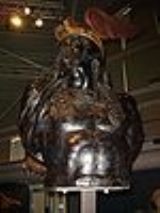
List of famous French military leaders
Encyclopedia
The following is a list of famous French military leaders from the Gauls
Gauls
The Gauls were a Celtic people living in Gaul, the region roughly corresponding to what is now France, Belgium, Switzerland and Northern Italy, from the Iron Age through the Roman period. They mostly spoke the Continental Celtic language called Gaulish....
to modern France. The list is necessarily subjective and incomplete.
| Portrait | Name | Years | Identity | Notes |
|---|---|---|---|---|
 |
Brennus | early 4th century BC | Gallic Gauls The Gauls were a Celtic people living in Gaul, the region roughly corresponding to what is now France, Belgium, Switzerland and Northern Italy, from the Iron Age through the Roman period. They mostly spoke the Continental Celtic language called Gaulish.... |
Destroyed the Roman army at the Battle of the Allia Battle of the Allia The Battle of the Allia was a battle of the first Gallic invasion of Rome. The battle was fought near the Allia river: the defeat of the Roman army opened the route for the Gauls to sack Rome. It was fought in 390/387 BC.-Background:... in 387 BC. |
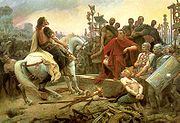 |
Vercingetorix Vercingetorix Vercingetorix was the chieftain of the Arverni tribe, who united the Gauls in an ultimately unsuccessful revolt against Roman forces during the last phase of Julius Caesar's Gallic Wars.... |
72 BC-46 BC | Gallic Gauls The Gauls were a Celtic people living in Gaul, the region roughly corresponding to what is now France, Belgium, Switzerland and Northern Italy, from the Iron Age through the Roman period. They mostly spoke the Continental Celtic language called Gaulish.... |
Fought Julius Caesar Julius Caesar Gaius Julius Caesar was a Roman general and statesman and a distinguished writer of Latin prose. He played a critical role in the gradual transformation of the Roman Republic into the Roman Empire.... during the Gallic Wars Gallic Wars The Gallic Wars were a series of military campaigns waged by the Roman proconsul Julius Caesar against several Gallic tribes. They lasted from 58 BC to 51 BC. The Gallic Wars culminated in the decisive Battle of Alesia in 52 BC, in which a complete Roman victory resulted in the expansion of the... . Defeated Caesar at the Battle of Gergovia Battle of Gergovia The Battle of Gergovia took place in 52 BC in Gaul at Gergovia, the chief town of the Arverni. The battle was fought between a Roman Republic army, led by proconsul Julius Caesar, and Gallic forces led by Vercingetorix... but was decisively beaten by Caesar at Alesia Battle of Alesia The Battle of Alesia or Siege of Alesia took place in September, 52 BC around the Gallic oppidum of Alesia, a major town centre and hill fort of the Mandubii tribe... . |
 |
Clovis Clovis I Clovis Leuthwig was the first King of the Franks to unite all the Frankish tribes under one ruler, changing the leadership from a group of royal chieftains, to rule by kings, ensuring that the kingship was held by his heirs. He was also the first Catholic King to rule over Gaul . He was the son... |
c. 466-511 | Frankish Franks The Franks were a confederation of Germanic tribes first attested in the third century AD as living north and east of the Lower Rhine River. From the third to fifth centuries some Franks raided Roman territory while other Franks joined the Roman troops in Gaul. Only the Salian Franks formed a... |
Successful leader of the Franks Franks The Franks were a confederation of Germanic tribes first attested in the third century AD as living north and east of the Lower Rhine River. From the third to fifth centuries some Franks raided Roman territory while other Franks joined the Roman troops in Gaul. Only the Salian Franks formed a... who quadrupled Frankish territory. |
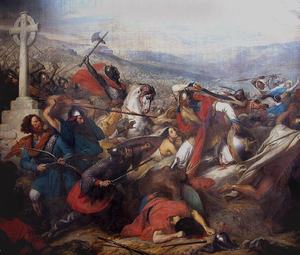 |
Charles Martel Charles Martel Charles Martel , also known as Charles the Hammer, was a Frankish military and political leader, who served as Mayor of the Palace under the Merovingian kings and ruled de facto during an interregnum at the end of his life, using the title Duke and Prince of the Franks. In 739 he was offered the... |
686-741 | Frankish Franks The Franks were a confederation of Germanic tribes first attested in the third century AD as living north and east of the Lower Rhine River. From the third to fifth centuries some Franks raided Roman territory while other Franks joined the Roman troops in Gaul. Only the Salian Franks formed a... |
Famous victor at the Battle of Tours Battle of Tours The Battle of Tours , also called the Battle of Poitiers and in Battle of the Court of the Martyrs, was fought in an area between the cities of Poitiers and Tours, located in north-central France, near the village of Moussais-la-Bataille, about northeast of Poitiers... in 732. The Christian triumph has captured the Western imagination ever since. |
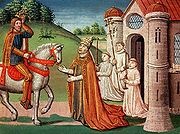 |
Charlemagne Charlemagne Charlemagne was King of the Franks from 768 and Emperor of the Romans from 800 to his death in 814. He expanded the Frankish kingdom into an empire that incorporated much of Western and Central Europe. During his reign, he conquered Italy and was crowned by Pope Leo III on 25 December 800... |
742/747-814 | Frankish Franks The Franks were a confederation of Germanic tribes first attested in the third century AD as living north and east of the Lower Rhine River. From the third to fifth centuries some Franks raided Roman territory while other Franks joined the Roman troops in Gaul. Only the Salian Franks formed a... |
Charlemagne established the strongest central administration in the Western world since the fall of the Western Roman Empire Western Roman Empire The Western Roman Empire was the western half of the Roman Empire after its division by Diocletian in 285; the other half of the Roman Empire was the Eastern Roman Empire, commonly referred to today as the Byzantine Empire.... in 476. |
 |
William the Conqueror William I of England William I , also known as William the Conqueror , was the first Norman King of England from Christmas 1066 until his death. He was also Duke of Normandy from 3 July 1035 until his death, under the name William II... |
1028–1087 | Norman Normans The Normans were the people who gave their name to Normandy, a region in northern France. They were descended from Norse Viking conquerors of the territory and the native population of Frankish and Gallo-Roman stock... |
One of the greatest commanders of the Middle Ages Middle Ages The Middle Ages is a periodization of European history from the 5th century to the 15th century. The Middle Ages follows the fall of the Western Roman Empire in 476 and precedes the Early Modern Era. It is the middle period of a three-period division of Western history: Classic, Medieval and Modern... , his victory at Hastings Battle of Hastings The Battle of Hastings occurred on 14 October 1066 during the Norman conquest of England, between the Norman-French army of Duke William II of Normandy and the English army under King Harold II... laid the foundations for a new era in English history History of England The history of England concerns the study of the human past in one of Europe's oldest and most influential national territories. What is now England, a country within the United Kingdom, was inhabited by Neanderthals 230,000 years ago. Continuous human habitation dates to around 12,000 years ago,... . |
 |
Philip II Augustus Philip II of France Philip II Augustus was the King of France from 1180 until his death. A member of the House of Capet, Philip Augustus was born at Gonesse in the Val-d'Oise, the son of Louis VII and his third wife, Adela of Champagne... |
1165–1223 | French French people The French are a nation that share a common French culture and speak the French language as a mother tongue. Historically, the French population are descended from peoples of Celtic, Latin and Germanic origin, and are today a mixture of several ethnic groups... |
Under his leadership, the French triumphed at the Battle of Bouvines Battle of Bouvines The Battle of Bouvines, 27 July 1214, was a conclusive medieval battle ending the twelve year old Angevin-Flanders War that was important to the early development of both the French state by confirming the French crown's sovereignty over the Angevin lands of Brittany and Normandy.Philip Augustus of... in 1214 and emerged as the most powerful nation in Europe Europe Europe is, by convention, one of the world's seven continents. Comprising the westernmost peninsula of Eurasia, Europe is generally 'divided' from Asia to its east by the watershed divides of the Ural and Caucasus Mountains, the Ural River, the Caspian and Black Seas, and the waterways connecting... . |
 |
Bertrand du Guesclin Bertrand du Guesclin Bertrand du Guesclin , known as the Eagle of Brittany or the Black Dog of Brocéliande, was a Breton knight and French military commander during the Hundred Years' War. He was Constable of France from 1370 to his death... |
c. 1320-1380 | French French people The French are a nation that share a common French culture and speak the French language as a mother tongue. Historically, the French population are descended from peoples of Celtic, Latin and Germanic origin, and are today a mixture of several ethnic groups... |
Carried out a wonderful ten-year campaign (1370–1380) during the second phase of the Hundred Years' War Hundred Years' War The Hundred Years' War was a series of separate wars waged from 1337 to 1453 by the House of Valois and the House of Plantagenet, also known as the House of Anjou, for the French throne, which had become vacant upon the extinction of the senior Capetian line of French kings... that saw the French recapture nearly all of the territory lost under the Treaty of Brétigny Treaty of Brétigny The Treaty of Brétigny was a treaty signed on May 9, 1360, between King Edward III of England and King John II of France. In retrospect it is seen as having marked the end of the first phase of the Hundred Years' War —as well as the height of English hegemony on the Continent.It was signed... . |
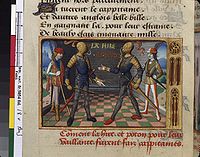 |
La Hire La Hire Étienne de Vignolles, called La Hire, was a French military commander during the Hundred Years' War. His nickname of La Hire would be that the English had nicknamed "the Hire-God" . He fought alongside Joan of Arc in the campaigns of 1429... |
c. 1390-1443 | French French people The French are a nation that share a common French culture and speak the French language as a mother tongue. Historically, the French population are descended from peoples of Celtic, Latin and Germanic origin, and are today a mixture of several ethnic groups... |
Most famous for leading the French vanguard in the spectacular victory at Patay Battle of Patay The Battle of Patay was the culminating engagement of the Loire Campaign of the Hundred Years' War between the French and English in north-central France. It was a decisive victory for the French and turned the tide of the war. This victory was to the French what Agincourt was to the English... . |
 |
Joan of Arc Joan of Arc Saint Joan of Arc, nicknamed "The Maid of Orléans" , is a national heroine of France and a Roman Catholic saint. A peasant girl born in eastern France who claimed divine guidance, she led the French army to several important victories during the Hundred Years' War, which paved the way for the... |
1412–1431 | French French people The French are a nation that share a common French culture and speak the French language as a mother tongue. Historically, the French population are descended from peoples of Celtic, Latin and Germanic origin, and are today a mixture of several ethnic groups... |
Turned the tide of the Hundred Years' War Hundred Years' War The Hundred Years' War was a series of separate wars waged from 1337 to 1453 by the House of Valois and the House of Plantagenet, also known as the House of Anjou, for the French throne, which had become vacant upon the extinction of the senior Capetian line of French kings... by leading the French to victory at the famous Siege of Orléans Siege of Orléans The Siege of Orléans marked a turning point in the Hundred Years' War between France and England. This was Joan of Arc's first major military victory and the first major French success to follow the crushing defeat at Agincourt in 1415. The outset of this siege marked the pinnacle of English power... . |
 |
Gaston de Foix | 1489–1512 | French French people The French are a nation that share a common French culture and speak the French language as a mother tongue. Historically, the French population are descended from peoples of Celtic, Latin and Germanic origin, and are today a mixture of several ethnic groups... |
Remembered for the great French victory at the Battle of Ravenna Battle of Ravenna (1512) The Battle of Ravenna, fought on 11 April 1512, by forces of the Holy League and France, was a major battle of the War of the League of Cambrai in the Italian Wars... in 1512, where he also prematurely lost his life. |
 |
Henry IV Henry IV of France Henry IV , Henri-Quatre, was King of France from 1589 to 1610 and King of Navarre from 1572 to 1610. He was the first monarch of the Bourbon branch of the Capetian dynasty in France.... |
1553–1610 | French French people The French are a nation that share a common French culture and speak the French language as a mother tongue. Historically, the French population are descended from peoples of Celtic, Latin and Germanic origin, and are today a mixture of several ethnic groups... |
His victory at Ivry Battle of Ivry The Battle of Ivry was fought on 14 March 1590, during the French Wars of Religion. The battle was a decisive victory for Henry of Navarre, the future Henry IV of France, leading Huguenot forces against the Catholic League forces led by the Duc de Mayenne... ensured the French Religious Wars French Wars of Religion The French Wars of Religion is the name given to a period of civil infighting and military operations, primarily fought between French Catholics and Protestants . The conflict involved the factional disputes between the aristocratic houses of France, such as the House of Bourbon and House of Guise... would be decided in favor of the Huguenots. |
 |
Turenne Henri de la Tour d'Auvergne, Vicomte de Turenne Henri de la Tour d'Auvergne, Vicomte de Turenne,often called simply Turenne was the most illustrious member of the La Tour d'Auvergne family. He achieved military fame and became a Marshal of France... |
1611–1675 | French French people The French are a nation that share a common French culture and speak the French language as a mother tongue. Historically, the French population are descended from peoples of Celtic, Latin and Germanic origin, and are today a mixture of several ethnic groups... |
One of the greatest commanders of all time, Turenne dominated the battlefields of Europe Europe Europe is, by convention, one of the world's seven continents. Comprising the westernmost peninsula of Eurasia, Europe is generally 'divided' from Asia to its east by the watershed divides of the Ural and Caucasus Mountains, the Ural River, the Caspian and Black Seas, and the waterways connecting... for several decades throughout the 17th century. His death at Sasbach in 1675 was universally mourned. |
 |
The Great Condé Louis II de Bourbon, Prince de Condé Louis de Bourbon, Prince of Condé was a French general and the most famous representative of the Condé branch of the House of Bourbon. Prior to his father's death in 1646, he was styled the Duc d'Enghien... |
1621–1686 | French French people The French are a nation that share a common French culture and speak the French language as a mother tongue. Historically, the French population are descended from peoples of Celtic, Latin and Germanic origin, and are today a mixture of several ethnic groups... |
He and Turenne were the dynamic duo that carried French armies to victory after victory during the reign of Louis XIV Louis XIV of France Louis XIV , known as Louis the Great or the Sun King , was a Bourbon monarch who ruled as King of France and Navarre. His reign, from 1643 to his death in 1715, began at the age of four and lasted seventy-two years, three months, and eighteen days... . His victory at the Battle of Rocroi Battle of Rocroi The Battle of Rocroi was fought on 19 May 1643, late in the Thirty Years' War. It resulted in a victory of the French army under the Duc d'Enghien, against the Spanish army under General Francisco de Melo.-Prelude:... in 1643 ushered a new era in military history, with cavalry attaining an operational importance unseen since the Middle Ages Middle Ages The Middle Ages is a periodization of European history from the 5th century to the 15th century. The Middle Ages follows the fall of the Western Roman Empire in 476 and precedes the Early Modern Era. It is the middle period of a three-period division of Western history: Classic, Medieval and Modern... . |
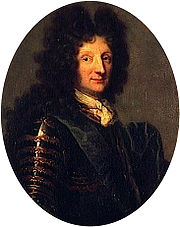 |
Maréchal Luxembourg | 1628–1695 | French French people The French are a nation that share a common French culture and speak the French language as a mother tongue. Historically, the French population are descended from peoples of Celtic, Latin and Germanic origin, and are today a mixture of several ethnic groups... |
Shined during the Nine Years War War of the Grand Alliance The Nine Years' War – often called the War of the Grand Alliance, the War of the Palatine Succession, or the War of the League of Augsburg – was a major war of the late 17th century fought between King Louis XIV of France, and a European-wide coalition, the Grand Alliance, led by the Anglo-Dutch... , leading French armies to famous triumphs at Fleurus Battle of Fleurus (1690) The Battle of Fleurus, fought on 1 July 1690, was a major engagement of the Nine Years' War. In a bold envelopment the Duc de Luxembourg, commanding Louis XIV’s army of some 35,000 men, soundly defeated Prince Waldeck’s Allied force of approximately 38,000 men comprising mainly Dutch, German, and... and Landen Battle of Landen The Battle of Landen , in the current Belgian province of Flemish Brabant, was a battle in the Nine Years' War, fought in present-day Belgium on 29 July 1693 between the French army of Marshal Luxembourg and the Allied army of King William III of England... , among others. |
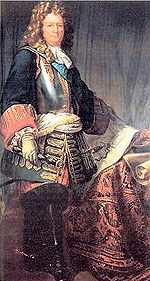 |
Vauban Vauban Sébastien Le Prestre, Seigneur de Vauban and later Marquis de Vauban , commonly referred to as Vauban, was a Marshal of France and the foremost military engineer of his age, famed for his skill in both designing fortifications and breaking through them... |
1633–1707 | French French people The French are a nation that share a common French culture and speak the French language as a mother tongue. Historically, the French population are descended from peoples of Celtic, Latin and Germanic origin, and are today a mixture of several ethnic groups... |
Arguably the greatest military engineer of all time, Vauban restructured the French defensive system so thoroughly that France became almost impregnable for much of the 17th and 18th centuries. |
 |
Maurice de Saxe | 1696–1750 | French French people The French are a nation that share a common French culture and speak the French language as a mother tongue. Historically, the French population are descended from peoples of Celtic, Latin and Germanic origin, and are today a mixture of several ethnic groups... |
Maurice de Saxe was one of the foremost commanders of the 18th century, especially renowned for his brilliant campaign in the War of the Austrian Succession War of the Austrian Succession The War of the Austrian Succession – including King George's War in North America, the Anglo-Spanish War of Jenkins' Ear, and two of the three Silesian wars – involved most of the powers of Europe over the question of Maria Theresa's succession to the realms of the House of Habsburg.The... , which led to the capture of Maastricht Siege of Maastricht (1748) The Siege of Maastricht took place in April-May 1748 during the War of the Austrian Succession. A French force under the overall command of Maurice de Saxe besieged and captured the Dutch barrier fortress of Maastricht in the final few months of the campaign in the Low Countries. After a relatively... in 1748. |
 |
Latouche Tréville Louis-René Levassor de Latouche Tréville Louis-René Levassor de Latouche Tréville was a French admiral and a hero of the American Revolutionary War and of the Napoleonic wars.-Early life:... |
1745–1804 | French French people The French are a nation that share a common French culture and speak the French language as a mother tongue. Historically, the French population are descended from peoples of Celtic, Latin and Germanic origin, and are today a mixture of several ethnic groups... |
Perhaps the most reliable naval commander Napoleon Napoleon I Napoleon Bonaparte was a French military and political leader during the latter stages of the French Revolution.As Napoleon I, he was Emperor of the French from 1804 to 1815... ever had, Tréville repeatedly proved his abilities by beating off Nelson’s attacks on the French fleet. |
 |
Lafayette Gilbert du Motier, marquis de La Fayette Marie-Joseph Paul Yves Roch Gilbert du Motier, Marquis de La Fayette , often known as simply Lafayette, was a French aristocrat and military officer born in Chavaniac, in the province of Auvergne in south central France... |
1757–1834 | French French people The French are a nation that share a common French culture and speak the French language as a mother tongue. Historically, the French population are descended from peoples of Celtic, Latin and Germanic origin, and are today a mixture of several ethnic groups... |
One of the most recognizable French personages during the American Revolutionary War American Revolutionary War The American Revolutionary War , the American War of Independence, or simply the Revolutionary War, began as a war between the Kingdom of Great Britain and thirteen British colonies in North America, and ended in a global war between several European great powers.The war was the result of the... , Lafayette was instrumental in convincing the French government to intervene on behalf of the colonies, providing the blueprint for ultimate victory. |
 |
André Masséna André Masséna André Masséna 1st Duc de Rivoli, 1st Prince d'Essling was a French military commander during the Revolutionary and Napoleonic Wars.... |
1758–1817 | French French people The French are a nation that share a common French culture and speak the French language as a mother tongue. Historically, the French population are descended from peoples of Celtic, Latin and Germanic origin, and are today a mixture of several ethnic groups... |
Great general of the French Revolutionary Wars French Revolutionary Wars The French Revolutionary Wars were a series of major conflicts, from 1792 until 1802, fought between the French Revolutionary government and several European states... and the Napoleonic Wars Napoleonic Wars The Napoleonic Wars were a series of wars declared against Napoleon's French Empire by opposing coalitions that ran from 1803 to 1815. As a continuation of the wars sparked by the French Revolution of 1789, they revolutionised European armies and played out on an unprecedented scale, mainly due to... . His memorable performances at the Second Battle of Zurich Second Battle of Zürich The Second Battle of Zurich was a French victory over an Austrian and Russian force near Zurich. It broke the stalemate that had resulted from the First Battle of Zurich three months earlier and led to the withdrawal of Russia from the Second Coalition.After he had been forced out of the city in... in 1799, the Battle of Caldiero in 1805, and various other actions throughout his career have earned him a spot among the top dignitaries in the French military pantheon. |
| Moreau Jean Victor Marie Moreau Jean Victor Marie Moreau was a French general who helped Napoleon Bonaparte to power, but later became a rival and was banished to the United States.- Early life :Moreau was born at Morlaix in Brittany... |
1763–1813 | French French people The French are a nation that share a common French culture and speak the French language as a mother tongue. Historically, the French population are descended from peoples of Celtic, Latin and Germanic origin, and are today a mixture of several ethnic groups... |
Great general of the French Revolutionary Wars French Revolutionary Wars The French Revolutionary Wars were a series of major conflicts, from 1792 until 1802, fought between the French Revolutionary government and several European states... . Moreau’s decisive victory at Hohenlinden in 1801 proved pivotal in ending the War of the Second Coalition War of the Second Coalition The "Second Coalition" was the second attempt by European monarchs, led by the Habsburg Monarchy of Austria and the Russian Empire, to contain or eliminate Revolutionary France. They formed a new alliance and attempted to roll back France's previous military conquests... . |
|
 |
Michel Ney Michel Ney Michel Ney , 1st Duc d'Elchingen, 1st Prince de la Moskowa was a French soldier and military commander during the French Revolutionary Wars and the Napoleonic Wars. He was one of the original 18 Marshals of France created by Napoleon I... |
1769–1815 | French French people The French are a nation that share a common French culture and speak the French language as a mother tongue. Historically, the French population are descended from peoples of Celtic, Latin and Germanic origin, and are today a mixture of several ethnic groups... |
Marshal of France during the Napoleonic Wars Napoleonic Wars The Napoleonic Wars were a series of wars declared against Napoleon's French Empire by opposing coalitions that ran from 1803 to 1815. As a continuation of the wars sparked by the French Revolution of 1789, they revolutionised European armies and played out on an unprecedented scale, mainly due to... , famous for his great courage ("le brave des braves"). Won the Battle of Elchingen Battle of Elchingen The Battle of Elchingen, fought on October 14, 1805, saw French forces under Michel Ney rout an Austrian corps led by Johann Sigismund Riesch. This defeat led to a large part of the Austrian army being invested in the fortress of Ulm by the army of Emperor Napoleon I of France while other... and distinguished himself in the Battle of Friedland Battle of Friedland The Battle of Friedland saw Napoleon I's French army decisively defeat Count von Bennigsen's Russian army about twenty-seven miles southeast of Königsberg... . He led the rearguard during the retreat from Moscow, securing the withdrawal from constant Russian attacks. |
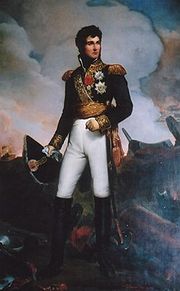 |
Jean Lannes Jean Lannes Jean Lannes, 1st Duc de Montebello, was a Marshal of France. He was one of Napoleon's most daring and talented generals. Napoleon once commented on Lannes: "I found him a pygmy and left him a giant"... |
1769–1809 | French French people The French are a nation that share a common French culture and speak the French language as a mother tongue. Historically, the French population are descended from peoples of Celtic, Latin and Germanic origin, and are today a mixture of several ethnic groups... |
Marshal of France during the Napoleonic Wars Napoleonic Wars The Napoleonic Wars were a series of wars declared against Napoleon's French Empire by opposing coalitions that ran from 1803 to 1815. As a continuation of the wars sparked by the French Revolution of 1789, they revolutionised European armies and played out on an unprecedented scale, mainly due to... . A close friend of Napoleon Napoleon I of France Napoleon Bonaparte was a French military and political leader during the latter stages of the French Revolution.As Napoleon I, he was Emperor of the French from 1804 to 1815... himself, Lannes distinguished himself at the battles of Montebello Battle of Montebello (1800) The Battle of Montebello was fought on 9 June 1800 near Montebello in Lombardy. During the lead-up to the Battle of Marengo, the vanguard of the French army in Italy engaged and defeated an Austrian force in a "glorious victory".-Background:... and Friedland Battle of Friedland The Battle of Friedland saw Napoleon I's French army decisively defeat Count von Bennigsen's Russian army about twenty-seven miles southeast of Königsberg... among many others before being prematurely killed on the battlefield at Essling Battle of Aspern-Essling In the Battle of Aspern-Essling , Napoleon attempted a forced crossing of the Danube near Vienna, but the French and their allies were driven back by the Austrians under Archduke Charles... . Napoleon later said of him: "I found him a pygmy and left him a giant." |
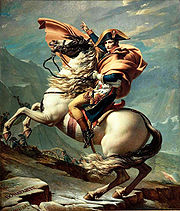 |
Napoleon Bonaparte Napoleon I of France Napoleon Bonaparte was a French military and political leader during the latter stages of the French Revolution.As Napoleon I, he was Emperor of the French from 1804 to 1815... |
1769–1821 | French French people The French are a nation that share a common French culture and speak the French language as a mother tongue. Historically, the French population are descended from peoples of Celtic, Latin and Germanic origin, and are today a mixture of several ethnic groups... |
Napoleon is often ranked among the greatest military commanders of all time. His campaigns established a new era in military history and are still studied at military academies all over the world. His victories at Rivoli Battle of Rivoli The Battle of Rivoli was a key victory in the French campaign in Italy against Austria. Napoleon Bonaparte's 23,000 Frenchmen defeated an attack of 28,000 Austrians under Feldzeugmeister Jozsef Alvinczi, ending Austria's fourth and final attempt to relieve the Siege of Mantua... , Austerlitz Battle of Austerlitz The Battle of Austerlitz, also known as the Battle of the Three Emperors, was one of Napoleon's greatest victories, where the French Empire effectively crushed the Third Coalition... , Friedland Battle of Friedland The Battle of Friedland saw Napoleon I's French army decisively defeat Count von Bennigsen's Russian army about twenty-seven miles southeast of Königsberg... , and Dresden Battle of Dresden The Battle of Dresden was fought on 26–27 August 1813 around Dresden, Germany, resulting in a French victory under Napoleon I against forces of the Sixth Coalition of Austrians, Russians and Prussians under Field Marshal Schwartzenberg. However, Napoleon's victory was not as complete as it could... still enthrall the popular imagination. |
 |
Davout Louis Nicolas Davout Louis-Nicolas d'Avout , better known as Davout, 1st Duke of Auerstaedt, 1st Prince of Eckmühl, was a Marshal of France during the Napoleonic Era. His prodigious talent for war along with his reputation as a stern disciplinarian, earned him the title "The Iron Marshal"... |
1770–1823 | French French people The French are a nation that share a common French culture and speak the French language as a mother tongue. Historically, the French population are descended from peoples of Celtic, Latin and Germanic origin, and are today a mixture of several ethnic groups... |
Widely regarded as Napoleon’s greatest marshal, Davout had a tenacious reputation for pulling off surprising victories. In 1806, 27,000 men of his legendary III Corps III Corps (Grande Armée) The III Corps of the Grande Armée were few military units during the Napoleonic Wars. The III Corps came to prominence between 1805 and 1809 under the command of Marshal Louis Nicolas Davout, when it repeatedly scored impressive victories single-handedly or in conjunction with other French forces... defeated 63,000 Prussians at the Battle of Auerstadt, inflicting 13,000 casualties and capturing 115 enemy guns. |
| Patrice MacMahon | 1808–1893 | French French people The French are a nation that share a common French culture and speak the French language as a mother tongue. Historically, the French population are descended from peoples of Celtic, Latin and Germanic origin, and are today a mixture of several ethnic groups... |
A brave and skilled general, distinguished himself in Algeria French rule in Algeria French Algeria lasted from 1830 to 1962, under a variety of governmental systems. From 1848 until independence, the whole Mediterranean region of Algeria was administered as an integral part of France, much like Corsica and Réunion are to this day. The vast arid interior of Algeria, like the rest... , the Crimean Crimean War The Crimean War was a conflict fought between the Russian Empire and an alliance of the French Empire, the British Empire, the Ottoman Empire, and the Kingdom of Sardinia. The war was part of a long-running contest between the major European powers for influence over territories of the declining... and Italy Second Italian War of Independence The Second War of Italian Independence, Franco-Austrian War, Austro-Sardinian War, or Austro-Piedmontese War , was fought by Napoleon III of France and the Kingdom of Piedmont-Sardinia against the Austrian Empire in 1859... . He fought well during the Franco-Prussian War Franco-Prussian War The Franco-Prussian War or Franco-German War, often referred to in France as the 1870 War was a conflict between the Second French Empire and the Kingdom of Prussia. Prussia was aided by the North German Confederation, of which it was a member, and the South German states of Baden, Württemberg and... , but was wounded and his army was forced to surrender at Sedan Battle of Sedan The Battle of Sedan was fought during the Franco-Prussian War on 1 September 1870. It resulted in the capture of Emperor Napoleon III and large numbers of his troops and for all intents and purposes decided the war in favour of Prussia and its allies, though fighting continued under a new French... . During the aftermath of the war he suppressed the Paris Commune Paris Commune The Paris Commune was a government that briefly ruled Paris from March 18 to May 28, 1871. It existed before the split between anarchists and Marxists had taken place, and it is hailed by both groups as the first assumption of power by the working class during the Industrial Revolution... . |
|
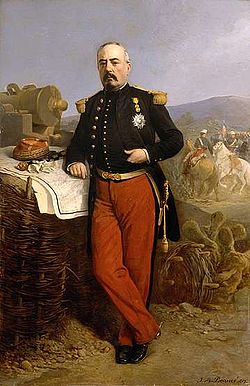 |
Bazaine François Achille Bazaine François Achille Bazaine was a French General and from 1864, a Marshal of France, who surrendered the last organized French army to the Prussians during the Franco-Prussian war. He was the first Marshal who had started as a legionnaire and like the great Marshals of the First Empire, he had risen... |
1811–1888 | French French people The French are a nation that share a common French culture and speak the French language as a mother tongue. Historically, the French population are descended from peoples of Celtic, Latin and Germanic origin, and are today a mixture of several ethnic groups... |
The great military hero of the Second Empire Second French Empire The Second French Empire or French Empire was the Imperial Bonapartist regime of Napoleon III from 1852 to 1870, between the Second Republic and the Third Republic, in France.-Rule of Napoleon III:... who proved himself in the Crimean War Crimean War The Crimean War was a conflict fought between the Russian Empire and an alliance of the French Empire, the British Empire, the Ottoman Empire, and the Kingdom of Sardinia. The war was part of a long-running contest between the major European powers for influence over territories of the declining... and at Solferino Battle of Solferino The Battle of Solferino, , was fought on June 24, 1859 and resulted in the victory of the allied French Army under Napoleon III and Sardinian Army under Victor Emmanuel II against the Austrian Army under Emperor Franz Joseph I; it was the last major battle in world... (1859) before conducting a horrible campaign during the Franco-Prussian War Franco-Prussian War The Franco-Prussian War or Franco-German War, often referred to in France as the 1870 War was a conflict between the Second French Empire and the Kingdom of Prussia. Prussia was aided by the North German Confederation, of which it was a member, and the South German states of Baden, Württemberg and... of 1870-1871. |
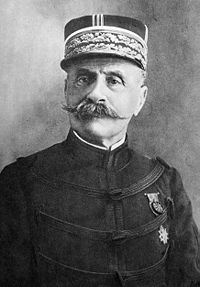 |
Ferdinand Foch Ferdinand Foch Ferdinand Foch , GCB, OM, DSO was a French soldier, war hero, military theorist, and writer credited with possessing "the most original and subtle mind in the French army" in the early 20th century. He served as general in the French army during World War I and was made Marshal of France in its... |
1851–1929 | French French people The French are a nation that share a common French culture and speak the French language as a mother tongue. Historically, the French population are descended from peoples of Celtic, Latin and Germanic origin, and are today a mixture of several ethnic groups... |
Foch was made the Supreme Allied Commander in 1918 during World War I World War I World War I , which was predominantly called the World War or the Great War from its occurrence until 1939, and the First World War or World War I thereafter, was a major war centred in Europe that began on 28 July 1914 and lasted until 11 November 1918... and engineered the very successful counter-attack at the Second Battle of the Marne Second Battle of the Marne The Second Battle of the Marne , or Battle of Reims was the last major German Spring Offensive on the Western Front during the First World War. The German attack failed when an Allied counterattack led by France overwhelmed the Germans, inflicting severe casualties... , a triumph that set off a series of Allied victories. |
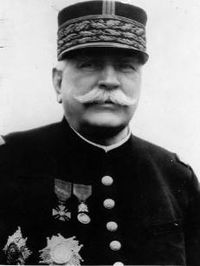 |
Joffre Joseph Joffre Joseph Jacques Césaire Joffre OM was a French general during World War I. He is most known for regrouping the retreating allied armies to defeat the Germans at the strategically decisive First Battle of the Marne in 1914. His popularity led to his nickname Papa Joffre.-Biography:Joffre was born in... |
1852–1931 | French French people The French are a nation that share a common French culture and speak the French language as a mother tongue. Historically, the French population are descended from peoples of Celtic, Latin and Germanic origin, and are today a mixture of several ethnic groups... |
Famous French commander of World War I World War I World War I , which was predominantly called the World War or the Great War from its occurrence until 1939, and the First World War or World War I thereafter, was a major war centred in Europe that began on 28 July 1914 and lasted until 11 November 1918... who regrouped the retreating Allied forces to defeat the Germans at the strategically decisive First Battle of the Marne First Battle of the Marne The Battle of the Marne was a First World War battle fought between 5 and 12 September 1914. It resulted in an Allied victory against the German Army under Chief of Staff Helmuth von Moltke the Younger. The battle effectively ended the month long German offensive that opened the war and had... in 1914. |
| Philippe Pétain Philippe Pétain Henri Philippe Benoni Omer Joseph Pétain , generally known as Philippe Pétain or Marshal Pétain , was a French general who reached the distinction of Marshal of France, and was later Chief of State of Vichy France , from 1940 to 1944... |
1856–1951 | French French people The French are a nation that share a common French culture and speak the French language as a mother tongue. Historically, the French population are descended from peoples of Celtic, Latin and Germanic origin, and are today a mixture of several ethnic groups... |
Another great French commander of World War I World War I World War I , which was predominantly called the World War or the Great War from its occurrence until 1939, and the First World War or World War I thereafter, was a major war centred in Europe that began on 28 July 1914 and lasted until 11 November 1918... , Pétain led the French to victory at Verdun Battle of Verdun The Battle of Verdun was one of the major battles during the First World War on the Western Front. It was fought between the German and French armies, from 21 February – 18 December 1916, on hilly terrain north of the city of Verdun-sur-Meuse in north-eastern France... and restored the army’s morale after the mutinies of 1917. In World War II World War II World War II, or the Second World War , was a global conflict lasting from 1939 to 1945, involving most of the world's nations—including all of the great powers—eventually forming two opposing military alliances: the Allies and the Axis... , he at first fought against and later collaborated with the Germans by leading the government of Vichy France Vichy France Vichy France, Vichy Regime, or Vichy Government, are common terms used to describe the government of France that collaborated with the Axis powers from July 1940 to August 1944. This government succeeded the Third Republic and preceded the Provisional Government of the French Republic... . |
|
 |
Louis Franchet d'Espérey | 1856–1942 | French French people The French are a nation that share a common French culture and speak the French language as a mother tongue. Historically, the French population are descended from peoples of Celtic, Latin and Germanic origin, and are today a mixture of several ethnic groups... |
Known as ‘Desperate Frankie’ by the British, d'Espèrey led the famous Vardar Offensive of 1918 that captured much of the Balkans Balkans The Balkans is a geopolitical and cultural region of southeastern Europe... and knocked Bulgaria Bulgaria Bulgaria , officially the Republic of Bulgaria , is a parliamentary democracy within a unitary constitutional republic in Southeast Europe. The country borders Romania to the north, Serbia and Macedonia to the west, Greece and Turkey to the south, as well as the Black Sea to the east... out of the war. |
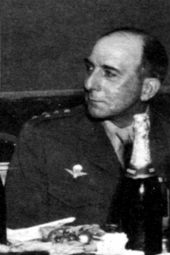 |
Maréchal Tassigny Jean de Lattre de Tassigny Jean Joseph Marie Gabriel de Lattre de Tassigny, GCB, MC was a French military hero of World War II and commander in the First Indochina War.-Early life:... |
1889–1952 | French French people The French are a nation that share a common French culture and speak the French language as a mother tongue. Historically, the French population are descended from peoples of Celtic, Latin and Germanic origin, and are today a mixture of several ethnic groups... |
Brilliant French commander during World War II World War II World War II, or the Second World War , was a global conflict lasting from 1939 to 1945, involving most of the world's nations—including all of the great powers—eventually forming two opposing military alliances: the Allies and the Axis... . As part of Operation Dragoon Operation Dragoon Operation Dragoon was the Allied invasion of southern France on August 15, 1944, during World War II. The invasion was initiated via a parachute drop by the 1st Airborne Task Force, followed by an amphibious assault by elements of the U.S. Seventh Army, followed a day later by a force made up... in 1944, his French Army B captured over 28,000 Germans and liberated Marseilles and Toulon Toulon Toulon is a town in southern France and a large military harbor on the Mediterranean coast, with a major French naval base. Located in the Provence-Alpes-Côte-d'Azur region, Toulon is the capital of the Var department in the former province of Provence.... . He also conducted several brilliant campaigns in the First Indochina War First Indochina War The First Indochina War was fought in French Indochina from December 19, 1946, until August 1, 1954, between the French Union's French Far East... , winning impressively at the Battle of Vinh Yen Battle of Vinh Yen The Battle of Vĩnh Yên , which occurred from 13 to 17 January 1951, was a major engagement in the First Indochina War between the French Union and the Việt Minh. The French Union forces, led by World War II hero Jean de Lattre de Tassigny, inflicted a decisive defeat on the Việt Minh forces, which... in 1951. |
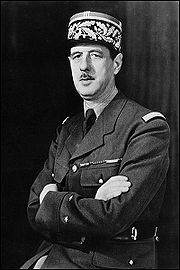 |
Charles de Gaulle Charles de Gaulle Charles André Joseph Marie de Gaulle was a French general and statesman who led the Free French Forces during World War II. He later founded the French Fifth Republic in 1958 and served as its first President from 1959 to 1969.... |
1890–1970 | French French people The French are a nation that share a common French culture and speak the French language as a mother tongue. Historically, the French population are descended from peoples of Celtic, Latin and Germanic origin, and are today a mixture of several ethnic groups... |
His theories about armored warfare were ignored by the French military establishment. Mostly noted for his stalwart leadership of the Free French Forces Free French Forces The Free French Forces were French partisans in World War II who decided to continue fighting against the forces of the Axis powers after the surrender of France and subsequent German occupation and, in the case of Vichy France, collaboration with the Germans.-Definition:In many sources, Free... during World War II World War II World War II, or the Second World War , was a global conflict lasting from 1939 to 1945, involving most of the world's nations—including all of the great powers—eventually forming two opposing military alliances: the Allies and the Axis... . |
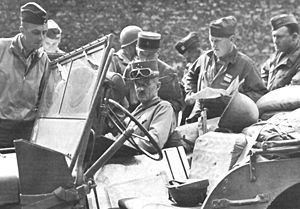 |
Maréchal Leclerc Philippe Leclerc de Hauteclocque Philippe François Marie, comte de Hauteclocque, then Leclerc de Hauteclocque, by a 1945 decree that incorporated his French Resistance alias Jacques-Philippe Leclerc to his name, , was a French general during World War II... |
1902–1947 | French French people The French are a nation that share a common French culture and speak the French language as a mother tongue. Historically, the French population are descended from peoples of Celtic, Latin and Germanic origin, and are today a mixture of several ethnic groups... |
Perhaps the greatest French military leader in the Second World War World War II World War II, or the Second World War , was a global conflict lasting from 1939 to 1945, involving most of the world's nations—including all of the great powers—eventually forming two opposing military alliances: the Allies and the Axis... , Leclerc’s desert campaigns and his drive on Paris Liberation of Paris The Liberation of Paris took place during World War II from 19 August 1944 until the surrender of the occupying German garrison on August 25th. It could be regarded by some as the last battle in the Battle for Normandy, though that really ended with the crushing of the Wehrmacht forces between the... in 1944 are still immortalized in French history. |

